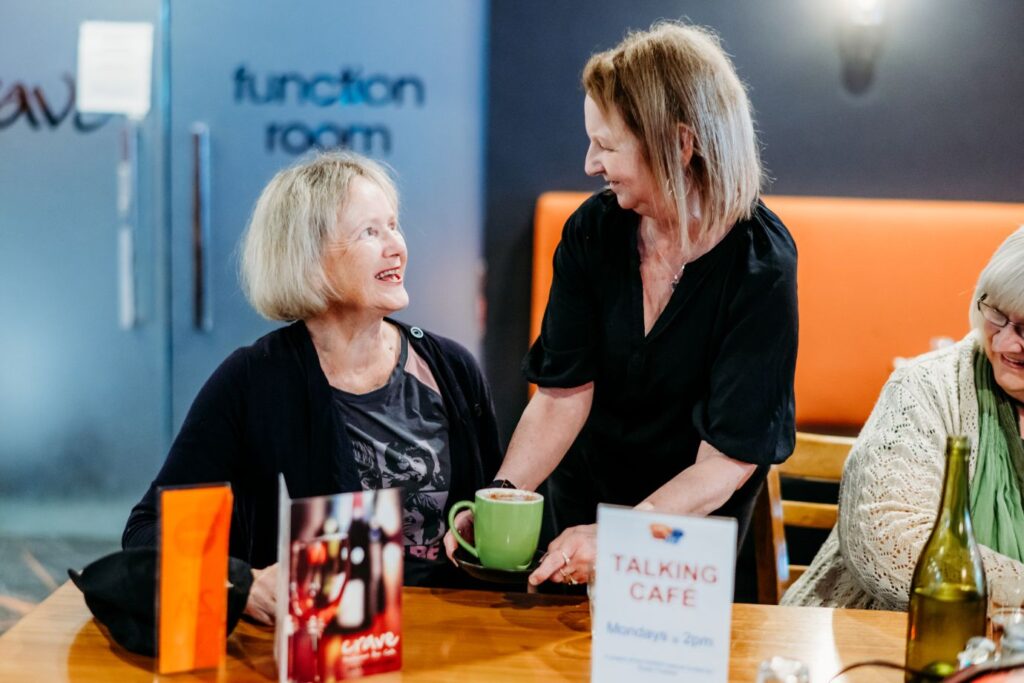A simple coffee and chat may seem small, but for older Australians at risk of social isolation, it can be a lifeline against loneliness.
It’s something that Leanne FitzGerald, a project leader at the Living Our Best Life project, has seen first-hand at the ‘Talking Cafes’ the organisation holds at locations across Australia each week.
Hosted by volunteers, the Talking Cafes are casual events that offer older people in the community a chance to sit at a cafe and have a chat with someone new, socialise, and learn about community events.
They have become a powerful tool that’s helping to destigmatise the loneliness that older people face.
More than half of Australians say they feel lonely in a typical week, according to Medibank’s latest loneliness population index.
This research also found that 32 per cent of older people who lived alone scored highly on the UCLA loneliness scale. The World Health Organisation has even recognised loneliness as a public health issue for older people.
People who find themselves unexpectedly alone due to the death of a spouse, separation from friends or family, retirement, loss of mobility and lack of transportation are at a particularly high risk of loneliness, studies show.

Getting involved
While some older people are keen to get involved in Talking Cafes quickly to build their social connections, for others it can take a few weeks to feel comfortable, Leanne Fitzgerald from the Living Our Best Life project, explains.
“People can walk past and have a look, or they can be having a coffee on their own and just listen and watch to see who comes and what it looks like,” she says.
“Because loneliness is so stigmatised, few of the people we deal with actually use that word at first.”
The Living Our Best Life project is particularly interested in the idea of social prescribing, and FitzGerald says it focuses on the importance of social connection for health. The model is inspired by Mendip Health Connections and the Bromley by Bow Centre in the United Kingdom.
“Rather than saying how bad it is to be lonely, we talk about how good it is for our physical and mental wellbeing to have good social health and good connections,” Fitzgerald says.
“And that works really well. And then when you talk about that way, people will then open up and start themselves to use the ‘L word’,” Fitzgerald says.
While both men and women attend Talking Cafes, Fitzgerald says women make up about 60 per cent of participants.
“[When] we’re out in the community, in a regular cafe, it’s more accessible for those people with the highest levels of social isolation and anxiety,” she says.
“It became apparent that a lot of older women in particular were just becoming socially isolated, particularly if they’d had major life transitions. We find some people, it’s retirement. They retire and work has been their social life. Others, it’s the loss of a partner.”

Caring for aging parents
As we know, it’s often women in mid-life who are left to straddle the pressures of work and family life. Caring for children and aging parents, alongside paid work, can be all-consuming.
Fitzgerald says the Living Our Best Life project, and other groups like it, can help fill that gap for women who may be concerned about an older relative’s social isolation.
“If you’re a family member who just can’t do it all because you’re working full time, then it can be useful to refer them to a project like ours where a volunteer will take on that role,” Fitzgerald says.
“Giving them [an older relative] the information, sharing it with them and helping to initiate that first step can be a good place to start.”
“People will know if they’ve got parents or elderly relatives who [need support] accessing information. They may not use the internet and no one puts anything in your letterbox anymore, so they don’t know what’s around.”
“We find for those that need it the most, taking the first step on your own is just too hard.”
Fitzgerald also urges women in midlife to consider their own social connections. After all, loneliness doesn’t discriminate.
“The other thing I would say to women in that age group too, is be mindful of your own social health, and take a minute or so to have a look at where your social contacts are. Are they online? Are they through work?
“Time goes by and you end up at retirement age, and your social situation could change almost overnight and leave you in the same position as the parent you might be worried about.”
To learn more about Medibank’s commitment to reducing loneliness head to We Are Lonely | Medibank.
Research commissioned by FiftyFive5 on behalf of Medibank. Research was conducted in July 2024, among a sample of (n=4,131) Australians.

